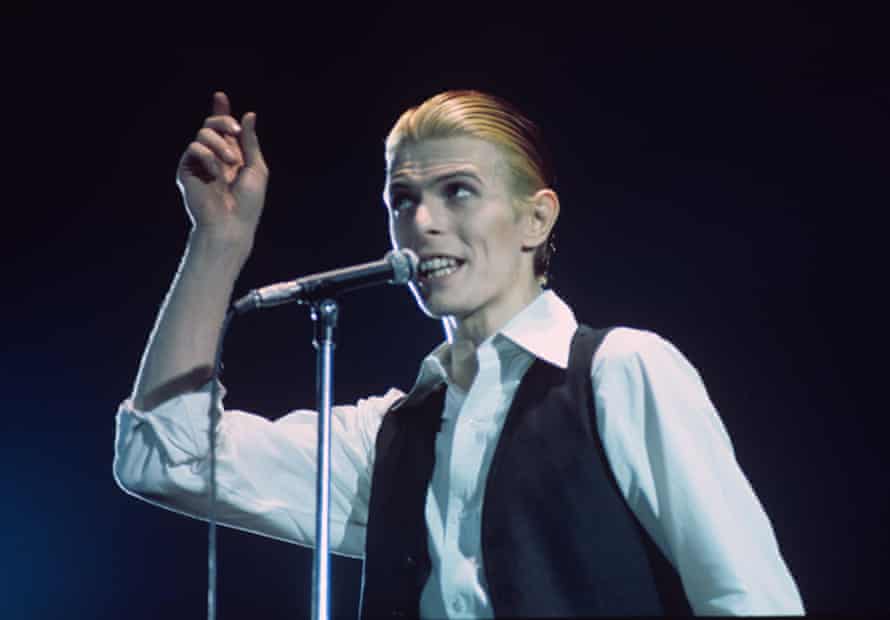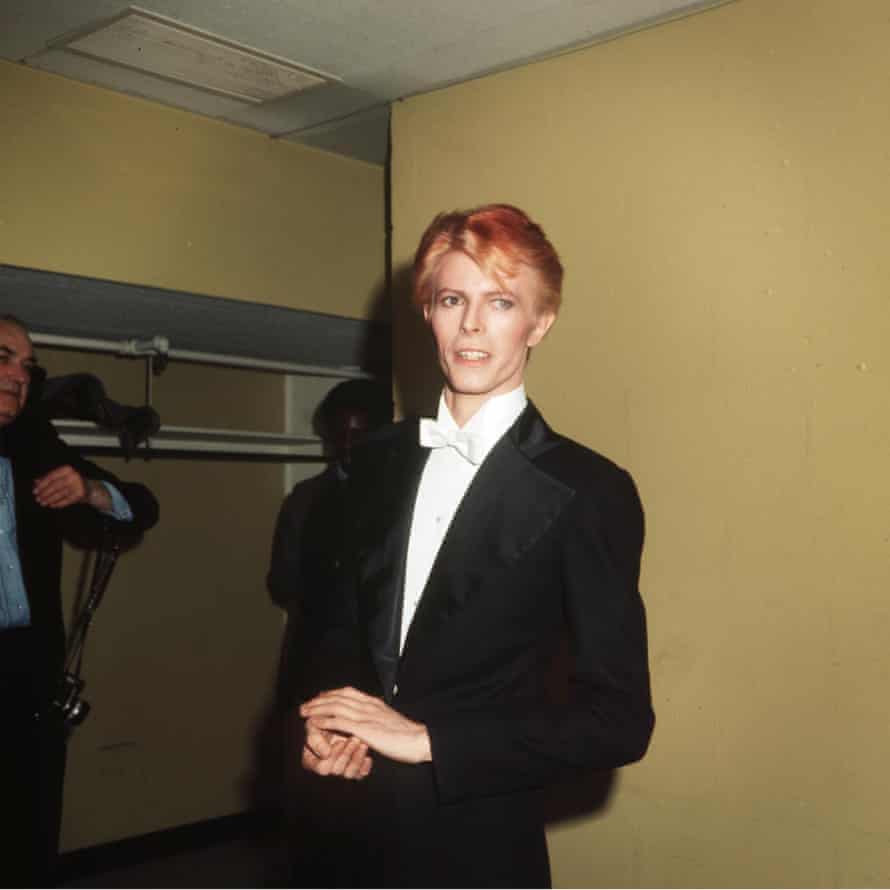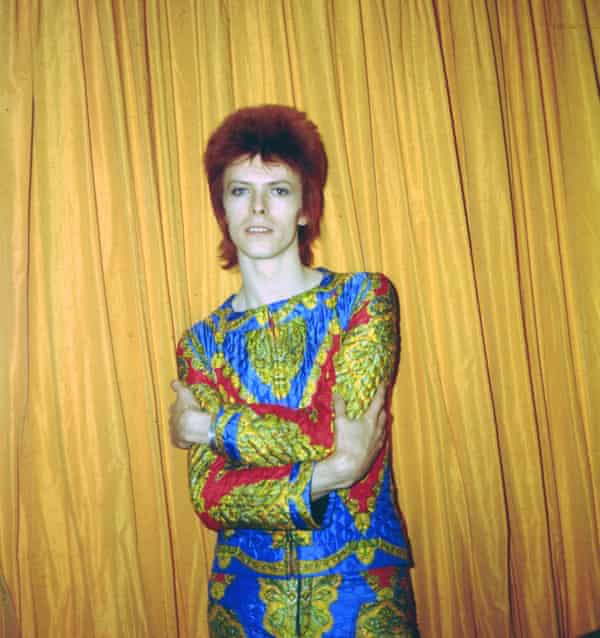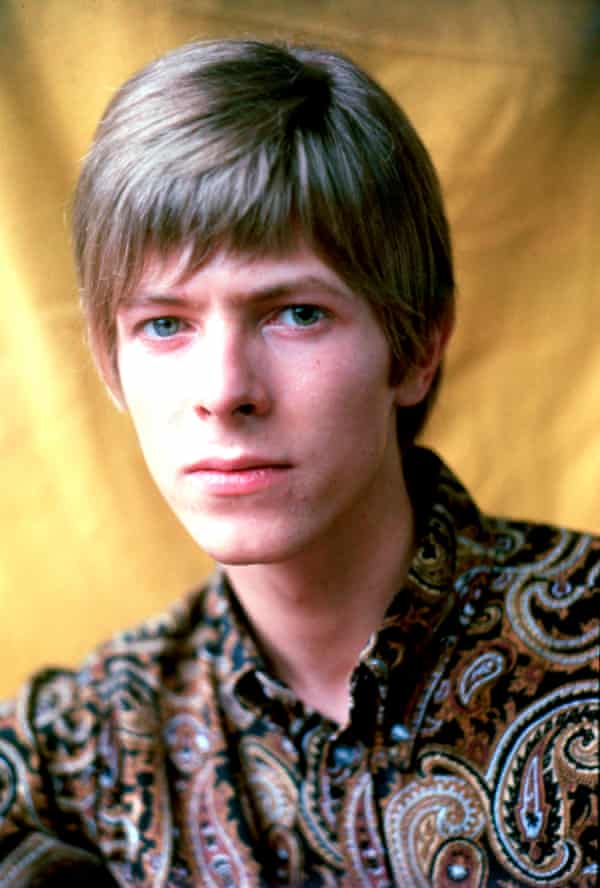Baby Universal (as Part of Tin Machine) David Bowie
50. Permit Me Sleep Abreast Y'all (1967)
A rejected single finally released on a 1970 cash-in compilation, Bowie'due south start collaboration with the producer Tony Visconti is amend than anything on his debut album. Driven by audio-visual guitar, its sound points the way ahead and at that place's something appealingly odd, even sinister virtually the lyrical come-ons: "Wear the dress your mother wore."
49. I Would Be Your Slave (2001)
Uniformly strong, the songwriting on Heathen stretched from the prosaic – the letter of the alphabet-to-adult-son of Everyone Says Hi – to the baffling. Its highlight sits somewhere between: ostensibly a love song that gradually reveals itself to be about God. The tune is beautiful, the organisation – very Visconti strings over electronic beats – perfectly poised.
48. Loving the Alien (1984)
The solitary moment that sparked on 1984'southward inspiration-complimentary Tonight. A strange, genuinely great song most religion smothered by overproduction. A 2018 remix helps matters a little, and the stripped-back 00s alive versions available online are better even so. The demo version – much talked upwards by Bowie in subsequently years – remains unheard.
47. Jump They Say (1993)
Hailed as a return to peak form on release, Black Tie White Noise was naught of the sort, simply its first single was authentically fantastic. Jittery but commercial funk is undercut past a dark lyric that returned to the subject of Bowie's mentally ill half-brother Terry, this time brooding on his 1985 suicide.
46. The London Boys (1966)
Tellingly, Bowie'south first great song centred on outsiders. A stark, brass- and woodwind-assisted delineation of those – like Bowie himself – left with their noses pressed confronting the glass of the Swinging London political party, it feels like a monochrome kitchen-sink drama compressed into three minutes.
45. Fantastic Voyage (1979)
The album Lodger opened with that rarest of things in the Bowie canon, a protest song. Inspired past the ongoing common cold state of war and its attendant nuclear paranoia, its combination of anger and fatalism still sounds pertinent. The music meanwhile is essentially a gentle reworking of Boys Keep Swinging: same central, same chords, only slower.

44. Lady Stardust (1972)
Ziggy Stardust's about emotionally affecting moment is one of its most straightforward songs. Driven by Mick Ronson'south piano, information technology paints a poignant film beautifully: an overhyped gig by a hot new band, i human being in the crowd sadly looking on as his younger ex-lover becomes a star. "I smiled sadly for a dear I could not obey."
43. 7 Years in Tibet (1997)
There was something charming most Bowie's enthusiastic pulsate'n'bass experiments on Earthling, just its finest track had zero to do with them: Bowie suggested it was inspired by 60s soul and the Pixies. Either way, its leaps from eerie atmospherics to blasting, wall-of-noise chorus are really exhilarating: an disregarded triumph.
42. Something in the Air (1998)
Another disregarded 90s gem, from the coolly received Hours, Something in the Air is both limpid and melancholy. The lyrics are filled with regret, the vocal parched and pained backside a liberal sprinkling of electronic distortion – and, when it hits its chorus, anthemic in a manner that hints at All the Young Dudes.
41. Joe the Lion (1977)
Joe the Lion defies explication. In one case you lot get by the opening lines about the transgressive self-mutilating performance artist Chris Burden – "Tell you who you are if yous nail me to my car" – the lyrics brand about no sense at all. The music – arcing, frantic atonal guitar and gibbering backing vocals – sounds deranged; Bowie sings like a human on the brink of a nervous breakdown. It is ridiculously exciting.
40. Hallo Spaceboy (1995)
Later a decade spent courtship the mainstream, Bowie conspicuously intended Outside to be seen as a m artistic statement. Information technology occasionally feels a flake laboured, but its highlights rank loftier: a Infinite Oddity-referencing Pet Shop Boys remix was a hit, but the original of Hallo Spaceboy is pummelling, chaotic and hypnotic.
39. I Can't Read (1989)
Tin Automobile was a difficult rock folly that largely hasn't aged well, but I Can't Read is the exception that proves the rule: a brilliant, agonised, self-baiting study of the creative inertia that had overwhelmed Bowie in the 80s, over a dense wall of sheet metal guitars and feedback.

38. Rock'n'Roll Suicide (1972)
Ostensibly the tragic, French-chanson-and-50s popular-influenced finale to the Ziggy Stardust story, Rock'n'Coil Suicide's ballsy coda seemed to have on a dissimilar, celebratory meaning as Bowie's star rose, his howl of "You're not lone / Requite me your hands / You're wonderful" summing upward his effect on his fans.
37. Bring Me the Disco King (2003)
There'due south a sense in which the final rail on Reality, the last anthology he made before his decade-long "retirement", would have worked perfectly as Bowie'southward farewell: a cute, weary, uncertain and elegiac rumination on the 70s, prepare to Mike Garson'southward distinctive piano, which shifts from hypnotic to spiky and surprising.
36. Always Crashing in the Same Car (1977)
"Self-pitying crap," sniffed Bowie subsequently, which tells you more about his despondent mood during Low'due south recording than the song itself. Always Crashing in the Same Machine is a sublime sliver of moody paranoia, with distracted-sounding vocals, electronics that alternately bubble and drone, wiry, effects-laden guitar.
35. Stay (1976)
"It'southward not the side-effects of the cocaine," Bowie protested unconvincingly on Station to Station's championship track, but Stay – a taut, twitchy funk-rock hybrid – audibly was. As usual with Station to Station, the chaos of its cosmos ("a cocaine frenzy," according to guitarist Carlos Alomar) isn't reflected in the finished production: information technology's perfectly poised and confident.
34. Croaky Actor (1973)
In that location is a particular strain of Bowie song from 1973/74 that sounds like the piece of work of someone who has had all the sex activity and drugs in the earth at once. Cracked Thespian may be the supreme example. A sleazy, biting blast of distorted guitar that sounds like it is seconds abroad from plummet, it'due south both intense and electrifying.
33. Moonage Daydream (1972)
You never want for high-drama rock anthemics on The Rise and Fall of Ziggy Stardust and the Spiders from Mars, but Moonage Daydream is the best case. Information technology switches from the opening guitar chord's strident call to something weirder and more ominous – its terminal encouragement to "freak out" doesn't sound peculiarly inviting – and features a mind-bravado Mick Ronson guitar solo.
32. Diamond Dogs (1974)
Halloween Jack, the persona Bowie adopted on Diamond Dogs, never enjoyed the aforementioned cultural impact as Ziggy Stardust or the Thin White Duke. That was no mistake of the album'due south title rails, a propulsive, compelling strut that is simultaneously sensual and dark, as evidenced by its troubling opening cry: "This ain't rock n' roll, this is … genocide!"

31. The Width of a Circle (1970)
Not everything on Bowie's self-consciously heavy album The Homo Who Sold the World works, but its opening track is remarkable. It opens with an acoustic guitar that might accept stepped off the 1969 David Bowie anthology, before exploding into something completely different: an viii-minute Ronson-powered homoerotic epic that swaggers with a newfound confidence.
30. John, I'm Only Dancing (1972)
Considered besides controversial to release in the United states of america, John, I'm Merely Dancing blithely turned the era's sexual mores on its head: in its lyrics, a direct relationship is the shocking, threatening aberration. The music, meanwhile, sashays insouciantly along – in another inspired theft, the guitar function is swiped from Alvin Cash's 1968 funk hit Keep on Dancing.
29. The Buddha of Bourgeoisie (1993)
Proof that Bowie worked in mysterious ways: it took a BBC 2 adaptation of Hanif Kureishi's The Buddha of Suburbia to return him to total creative ability. Amid the Blackstar-prefiguring free-jazz experiments and Depression-esque instrumentals lurked the fantastic, cocky-referential championship track, a keen drawing of pre-fame Bowie, "screaming along in south London … ready to learn".
28. Fame (1975)
Made upward on the hoof in the studio – and allegedly constructed by Bowie cutting upward a recording of Alomar playing a comprehend of the Flares' 1961 hit Foot Stompin' – Fame is a fantastic slice of funk, rendered nervy and strange by the pained commitment of lyrics that accept a jaundiced view of the song's subject: "The flame that burns your change to keep you insane."
27. Scary Monsters (and Super Creeps) (1980)
Boasting a preposterously phase-y mockney vocal – "she 'ad an 'orror of rooms" – Scary Monsters' title runway apparently dated back to the early 70s. Bowie had attempted to donate it to Iggy Pop, before reconsidering. It'due south the anthology's most viscerally exciting moment: frenzied and aggressive, information technology coats everything from the guitars to Bowie's vocalization in distortion.

26. All the Young Dudes (1972)
Glam rock's unofficial national anthem. All the Immature Dudes announced the arrival of a new era in pop via a Lou Reed-ish cast of characters – cross-dressers, speed freaks talking about suicide – and a timely, remarkably cocky dismissal of the past: "My brother's back at home with his Beatles and his Stones … what a drag."
25. Space Oddity (1969)
In his excellent book The Complete David Bowie, Nicholas Pegg notes that the episodic Space Oddity sounds like something the 60s Bee Gees might have written at their weirdest. He's absolutely right, although where the Bee Gees would have played upward the melodrama, Bowie perfectly inhabits its mood of blank-eyed, infinite-age alienation.
24. Where Are We Now? (2013)
The excitement over Bowie'due south surprise re-emergence mayhap acquired The Adjacent Day to exist slightly overrated, but its best moments are magnificent, non least Where Are We At present?'s recollection of Bowie's tardily 70s sojourn in Berlin. Fond, nostalgic and oddly fragile, it still sounds moving.
23. The Man Who Sold the World (1970)
It'southward a song that was later on rendered equally everything from pop-soul (by Lulu) to despairing acoustic commentary on global success and punk rock ethics (Nirvana), but Bowie'due south original version has never been bettered. The title rail of his eeriest anthology remains mysterious, creepy and haunting 50 years on.
22. I Can't Give Everything Away (2016)
Of the Blackstar songs whose meaning suddenly pulled into focus with the news of Bowie's death, none is more than affecting than I Tin can't Requite Everything Away. The music is gloriously buoyant, simply it's hard to meet the lyrics equally anything other than a human being bidding farewell, the musical quotation from Low's A New Career in a New Town perfectly judged and poignant.
21. Fashion (1980)
Brilliantly claustrophobic, reggae-influenced postal service-punk funk that casts a jaundiced center over the always-irresolute trends in the world of the hip. The ironic tone of Manner seemed to be largely missed, possibly because the thought of David Bowie, of all people, protesting about ever-irresolute trends was frankly a fleck rich.
twenty. The Bewlay Brothers (1971)
In that location's a compelling statement that the incredible flowering of songwriting talent on Hunky Dory may brand it Bowie'due south greatest album. Its most striking moment may be its boggling, enigmatic acoustic finale – possibly a delineation of Bowie's human relationship with his half-blood brother Terry – that goes from becalmed to chilling to genuinely frightening.

xix. The Jean Genie (1973)
Aladdin Sane's Ziggy-goes-to-America concept in miniature, The Jean Genie is tougher and sleazier than annihilation on Ziggy Stardust – its I'm A Human-ish guitar riff and bursts of harmonica sound absolutely filthy. Anyone inclined to view pop'due south by through rose-tinted glasses should note it was kept off No 1 by Jimmy Osmond's Long-Haired Lover From Liverpool.
18. Let'due south Dance (1983)
The divergence between Allow's Dance and Bowie's other 80s pop albums is that his center was in it; even if he was largely out to make coin, he fabricated an effort. If its title runway signalled his temporary abandonment of the avant garde, it'southward even so a superb song, nervier and stranger than its global smash condition might suggest.
17. Win (1975)
A ballad draped in echoing, fluttering sax, Win is utterly gorgeous. Despite Bowie's insistence it was an attack on artistic rivals who didn't piece of work hard enough, there's something oddly sexy about it, non least his delivery of the line: "Someone like yous should not be allowed to start whatever fires."
16. Rebel Rebel (1974)
Bowie's fabled, valedictory cheerio to glam, Rebel Insubordinate is substantially a loving salute to the kids Bowie had inspired, a metaphorical arm around the shoulder of every teenage misfit who had always posed in a sleeping accommodation mirror. "You tacky thing," he sings, delightedly, "you lot put them on" – set up to one of the all-time great rock riffs.
xv. Changes (1971)
A perfectly written, irresistible mission statement that few heeded at the fourth dimension, Changes has ended upward 1 of Bowie's most love songs. "It's saying: 'Await, I'm going to exist so fast, you lot're non going to proceed upward with me,'" he explained. Information technology would count as youthful arrogance were it non for the fact that his subsequent career bore the avowal out.
14. Golden Years (1976)
A moment of straightforward joy amid the complex, troubled emotional terrain of Station to Station, Aureate Years perfectly matches its lyrical optimism with glittering, shimmering funk. What it would take sounded like had Bowie'southward original plan to requite the song to Elvis Presley is anyone's judge.
thirteen. Accented Beginners (1985)
The theme to Julien Temple'southward universally derided film of the same name, Absolute Beginners may well be the high bespeak of Bowie's 80s commercial phase. Information technology's a stately, sweeping, undeniable love song that reunited him with the pianist Rick Wakeman, and – at an creative nadir – proved Bowie could withal write incredible songs when he felt like it.
12. Boys Keep Swinging (1979)
Greeted with thwarting on release, Lodger's reputation has grown with the years. It's uneven, but contains some incredible songs, non least Boys Keep Swinging, which condensed the kind of sonic overload institute on "Heroes" into a sparky iii-infinitesimal pop vocal, consummate with lyrics that archly, camply celebrated machismo.
11. Starman (1972)
More than a cultural moment than a vocal. Starman's epochal Top of the Pops performance is probably the near celebrated piece of music tv in British history. It's a series of compelling musical steals – equal parts T Rex, Somewhere Over the Rainbow and Blue Mink's recent hit Melting Pot (the morse code guitar) – and a brash announcement of Bowie's commercial rebirth.
10. Drive-In Saturday (1973)
Glam doo-wop decorated with bursts of fizzing synthesiser, Drive-In Sabbatum is one of Bowie's greatest singles, despite its peculiar lyrical premise. In "about 2033", nuclear war has caused humanity to forget how to take sex and they have to relearn seduction techniques from old films. Incredibly, given its subject matter, the vocal sounds swooningly romantic.

nine. 'Tis a Pity She Was a Whore (2016)
Before Blackstar was revealed as the most exquisitely staged concluding act in rock history, it sounded thrillingly like a new beginning. A relentless, intense drum loop decorated with squalls of sax, Tis Pity She Was a Whore was unlike annihilation Bowie had washed before. His final exultant whoop suggests he knew exactly how smashing it was.
eight. Oh! You Pretty Things (1971)
There was an apocalyptic strain in Bowie's songwriting almost from the start – run into Nosotros Are Hungry Men from his 1967 debut – but it was never more beautifully expressed than on Oh! You Pretty Things, a song that sets an incredibly bleak message to a melody so lovely information technology could be covered by the pb singer of Herman's Hermits.
7. Young Americans (1975)
Immature Americans represents the point in Bowie'south career where it became credible he could take near any musical genre and bend it to his will. A white British rock star adopting the informal, sumptuous sound of Philly soul shouldn't accept worked at all, but it did, to life-affirming effect.
6. Sweet Thing/Candidate/Sweet Matter (Reprise) (1974)
The medley on side 1 of Diamond Dogs is the album's sickly heart, 7 minutes of music that takes glam rock every bit far every bit it could go. Information technology'due south then decadent and diseased-sounding it must have been hard to imagine where Bowie could possibly go side by side. As it turned out, he was just getting started.
5. "Heroes" (1977)
Its posthumous uplifting-sporting-montage-soundtrack ubiquity ways it's easy to forget what a weird, cryptic song Heroes is – it has, metaphorically, lost the quotation marks effectually its title. But perhaps that is tribute to Bowie's brand of alchemy: only he could turn six minutes of pulsing electronic noise, howling guitars and screamed vocals into an all-purpose air-punching canticle.
4. Life on Mars? (1971)
A no-further-questions masterpiece, bolstered by Ronson's fantastic cord arrangement, Life On Mars?'s confusing gush of images virtually defies explication, just might well be Bowie's get-go clarion phone call to suburban misfits. Information technology says a lot nearly the sheer power of its tune that a song so lyrically impenetrable has get and then widely loved.
3. Station to Station (1976)
Past his own account and so out of control he couldn't even retrieve recording information technology, Bowie somehow contrived to make Station to Station a work of awesome ability and focus, every bit evidenced by the lengthy title rails. The shift into its second section – "Once there were mountains and mountains" – is perhaps the single near thrilling moment in his entire catalogue.
ii. Ashes to Ashes (1980)
Ashes to Ashes is one of those moments in Bowie'due south catalogue where the correct response is to stand back and boggle in awe. Presumably a delineation of its writer in his drugged-out mid-70s nadir, everything about it – lingering oddness of its sound, its constantly shifting melody and emotional tenor, its alternately self-mythologising and self-doubting lyrics – is perfect.

one. Sound and Vision (1977)
Picking Bowie's l best songs is a thankless task. His back catalogue is and then rich, y'all inevitably stop up having to lose tracks equally every bit skillful as those you take picked in the procedure: Queen Bowwow, Suffragette Urban center, Exist My Wife, Dollar Days. Picking his all-time is even worse, but Sound and Vision is both a fantastic pop song and an human action of artistic daring. A iii-minute hit single that doesn't even feature a pb vocal until halfway through, information technology twists a despondent lyric into something uplifting and, musically, transcends time. Completely original, zilch nearly its sound tethers it to the mid-70s. Its magic seems to sum Bowie up.
Source: https://www.theguardian.com/music/2020/mar/19/david-bowie-50-greatest-songs-ranked
0 Response to "Baby Universal (as Part of Tin Machine) David Bowie"
Post a Comment